-
Answering FAQs About Industrial Solid Waste
If you own or manage an industrial plant or factory, your waste management will typically be monitored by the EPA or another federal organization. To make sure that your waste management procedures comply with federal regulations, you should work with a company that specializes in managing industrial waste near Atlanta . Your waste disposal company can help you create onsite solutions and collection plans for all of your solid waste. Let’s answer some of the most commonly asked questions that business owners have about their industrial solid waste.
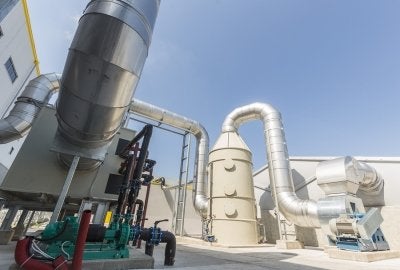
What is the definition of industrial solid waste?
In order to properly manage your industrial solid waste, it is helpful to understand how this category of waste is defined. Typically, industrial solid waste is categorized as any waste product that is in a solid, partially solid, or enclosed gaseous state after it has been generated. In order for waste to become labeled as industrial solid waste, it must be produced during an industrial or manufacturing process.
Are there methods for reducing industrial solid waste?
Many industrial businesses are interested in reducing the amount of solid waste that they create during their daily operations. Solid waste reduction can help to make a company’s manufacturing process more efficient, and waste reduction is also environmentally friendly. To reduce solid waste production, it may be possible to install new machinery that is designed to be more efficient, using fewer resources. Proper facility maintenance can also go a long way towards reducing solid waste in an industrial setting.
How can solid industrial waste be managed?
An experienced industrial waste management company can provide you with disposal and pickup services that will help to streamline your solid industrial waste management. Rather than relying on onsite services for proper containment and disposal, you can hire your waste management professionals to pick up, sort, and dispose of your solid waste using the latest waste management technology. Outsourcing your solid industrial waste management will help you ensure that your waste management plan complies with federal regulations.
-
The Effects of Plastic Bags on Marine Life
Trash bags and other forms of plastic waste have a significant impact on the safety and wellbeing of ocean creatures. In this video from National Geographic, you will take a dramatic look at what is like for a marine creature to become trapped in a plastic bag. With proper waste management in Atlanta, you can do your part to protect our oceans.
If you would like to set up plastic recycling services for your home or business, be sure to get in touch with a qualified recycling center that services your local area. Your waste management professionals can help you create an ocean-conscious recycling program that helps to preserve our marine life for many generations to come.
-
The Importance of Commercial Recycling
Does your company practice recycling in Atlanta? If not, then you may be interested in learning about the benefits that commercial recycling programs offer business owners. Continue reading to learn about the importance of commercial recycling.
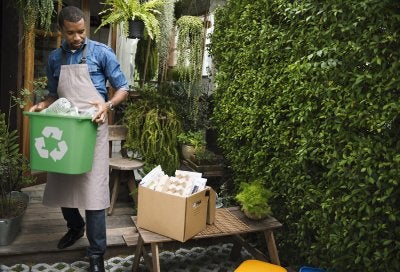
Protecting the Environment
Recycling benefits the environment in many ways. By recycling materials instead of throwing them in the waste bin, for example, your company can help reduce the amount of trash sent to local landfills. Also, recycling lessens the demand for raw materials that would otherwise need to be refined or mined. In this way, recycling can help reduce energy needs and the impact of mining and manufacturing on air quality and the environment.
Reducing Operational Costs
Instituting a commercial recycling program for your company is more than good for the environment because you can save on waste collection costs by tossing more of your waste into recycling bins. By using containers for metal, paper, and plastic recycling, you can potentially cut down on the number of dumpsters or trash pickups that your company requires.
Improving Resource Efficiency
When companies begin a recycling program, it’s common for areas of unnecessary waste to come to light. By paying more attention to the type and amount of materials that you use and adjusting your practices, your company may be able to spend less money on supplies and waste collection.
Enhancing Company Image
Going green is an excellent way to improve the way that the public views your company. For this reason, you can benefit from conducting an energy audit of your facility and learning where your biggest areas of improvement are. Then, you can enhance your company’s public image by tracking and reporting the progress of your green programs.
Boosting Employee Satisfaction
With the growing awareness of the impact of recycling on the environment, more and more people expect to be able to recycle in the workplace. Beginning recycling programs and similar ventures are excellent ways to improve employee satisfaction by helping them help their environment.
-
Start Planning for America Recycles Day
As effective as recycling serving Atlanta can be, it can only make a difference if everyone commits to the cause. It’s important to raise awareness of the importance of responsible waste disposal, and people can only employ the right practices if they understand them. The purpose of America Recycles Day is to spread the word and educate people about the processes and benefits of recycling and responsible waste management. It’s also easy to find the materials you need to keep your community educated and motivated. Feel free to continue reading, and be sure to start planning for America Recycles Day .
America Recycles Day is a nationwide holiday that encourages people to celebrate the power of recycling and sustainability. There are events held all over the country that are dedicated to teaching people how to recycle, what the process is like, and what kinds of materials can be recycled. People of all ages should understand how the practice of recycling can reduce our collective carbon footprint, keep waste out of landfills, and bring reusable materials back into circulation. From elementary school classrooms to corporate offices, people everywhere can come to recognize the importance of sustainability thanks to America Recycles Day events.
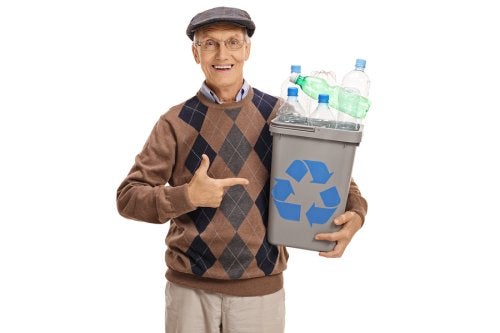
-
History’s First Recyclables
The history of recycling can be traced as far back as the 1800s. During this era, people of all social categories chose to repurpose or reuse items, rather than tossing them into the trash. While today we are familiar with plastic recycling and scrap metal recycling, the earliest recyclables were much more unusual. By renting new recycling bins in Atlanta , you can make sure that you have space for all of your recycled goods.
Some of history’s first recyclables were items that were commonly found around homes of the era. In the 19 th century, clothing items were recycled to create rags, paper, and other essential goods. Metal items were also among the first recycled goods. Well into the 20 th century, families also recycled and reused other household items, such as biscuit tins, flour sacks, and cooking waste. The earliest recycling efforts paved the way for the modern methods that we use today.
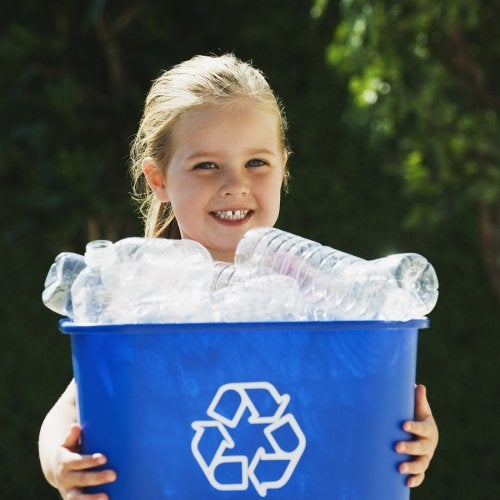
-
What Happens to Recycled Electronics?
While your old electronic items may seem like they are no longer useful, these devices are actually very valuable after they have been processed at the recycling center. In this video from Recycle Now, you will learn about what happens to electronics after they are sent to a recycling center. A facility that specializes in scrap metal recycling in Atlanta will process your recycled electronics with the utmost care.
Once your electronics have been placed in the recycling bin, they will be sent to a processing plant to be carefully recycled. In order to recycle electronic waste , a plant must first shred the old electronics. The shredded material is then carefully processed by the recycling center. Pieces of metal, plastic, and glass are then sorted and transformed into brand new items.
-
Classifying Types of Paper for Recycling
When you implement a recycling program for your home or commercial office, chances are that you will be recycling a significant amount of paper products. Designated recycling bins will help you separate paper goods from other recyclables, such as plastics or metals. If you are planning to recycle near Atlanta , it is a terrific idea to gather information about various types of paper products and how they can be recycled. To help you gear up for your new waste management plan, read on for an overview of the different classifications for paper and cardboard recycling.
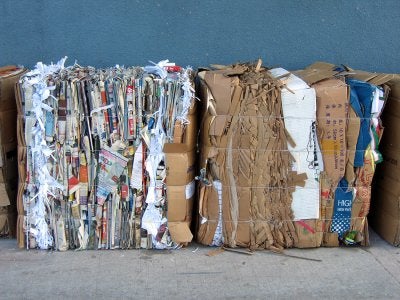
OCC
The term OCC stands for Old Corrugated Containers, and corrugated cardboard is among the most commonly recycled paper products. You can identify whether you are recycling OCC by looking at its material composition. Typically, OCC is distinguished by its ridged surface, which is housed between two flat pieces of cardboard. OCC can be recycled and transformed into a variety of other materials, including postal boxes, paper bags, and more.
ONP
When you have old issues of the newspaper on hand, you will need to figure out how to recycle your ONP, or Old Newspaper. A newspaper is only classified as ONP after it has been distributed to a home or business client for review. When ONP is recycled, it can be transformed into many different types of useful products, including paperboard, tissue, and art paper. In order to process ONP, your recycling center may need to send this material to a special paper mill.
High-Grade Deinked Paper
Business offices and other commercial settings often create large quantities of high-grade paper waste. Some examples of high-grade paper include letterhead, stationary, and business documents. Before high-grade paper can be transformed into new products, it must be sent through a deinking procedure. Removing the ink allows the recycler to process the paper, without having to deal with color inconsistences or variations.
-
Encouraging Reduce, Reuse, Recycle in the Workplace
Whenever you implement a new waste management strategy for your company, it can be tough to ensure that all of your workers are on board with your plan. However, a company that specializes in recycling serving Atlanta will be able to help you plan smart strategies that will help all of your workers reduce their overall waste. After you have placed recycling bins throughout your office, it will be up to you to make sure that they are used properly. Here is a look at some tips that will help you encourage your workers to reduce, reuse, and recycle.
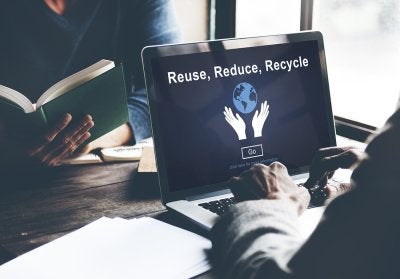
Make Your Waste Policies Known
One of the best ways to encourage your employees to reduce their waste production is to make sure that your business waste policies are clearly outlined for all of your workers. If you will be embarking on a new recycling program, you may want to send out a company wide memo that details the specifics of how to recycle in the workplace. By arming your workers with information about recycling, you can help them cut back on their waste.
Encourage Electronic Communication
Many businesses generate large amounts of paper waste throughout the course of a workday. Rather than having your employees print out all of their notes and correspondences, you may want to create a system that allows them to communicate electronically. Email servers, cloud computing, and other forms of technology have made it easier than ever to reduce the amount of paper waste that is generated in an office setting.
Clearly Label Your Recycling Bins
If your workers are unaware of how to correctly recycle their waste, they will have trouble following your waste management strategy. Once you have placed recycling bins around your office, you will want to clearly label them with their correct contents. For example, if a bin can only accept paper waste, you will want to label it with this information.
-
What Happens to Recycled Plastic?
Does your home or business use recycling bins in Atlanta as part of a responsible waste management program ? If so, then you may be wondering what happens to the empty water bottles and milk gallons that you toss in the bin. Continue reading to learn what happens to recycled plastic.
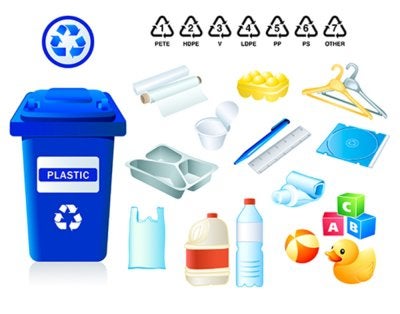
The plastic is collected.
To begin the recycling process, used plastic items are first collected through industrial, commercial, and residential recycling programs. The materials that are collected are then transported to a facility that specializes in sorting the plastic, paper, metal, and other items. Also, the plastic items might be sorted into those that come from plastic bottles, plastic bags, and other plastic varieties. Then, the sorted materials are baled and prepared for transport.
The plastic is processed.
The bales of plastic materials are sent to a manufacturing facility and then processed. During this stage, the plastic is chopped up into small pieces to make them easier to process. Next, to ensure a quality product at the end of the plastic recycling process, the little pieces of plastic are cleansed of any labels, dirt, or other debris before being dried. Finally, the clean plastic pieces are melted and then compressed into little pellets. At this stage, the processed plastic that has been transformed into little pellets is sold to various industries to be transformed into something new.
The plastic is reused.
Once the recycled plastic is in the hands of manufacturers, it can be used for a wide range of purposes. Your recycled milk jugs, laundry detergent containers, and shampoo bottles, for example, are usually made of a sturdy but lightweight plastic that, after being recycled, can be used to make items like new milk jugs, lawn décor, plastic lumber, and recycling bins. Your plastic grocery bags, food wrappers, and bubble wrap can be utilized to make everything from playground equipment and park benches to fencing and new plastic bags. Finally, your soft drink and water bottles can be recycled and made into items such as clothing, carpeting, sleeping bags, and new bottles.
-
How Plastic Bottles Are Recycled
Recycling systems offer business owners a simple and smart way to reduce their company’s operational costs and carbon footprint. Does your business practice plastic recycling near Atlanta ? If so, then watch this video to get a glimpse of how this material is recycled.
Once the plastic reaches the recycling facility, it is first run through a shredder, which helps release any liquid left behind in plastic bottles. Then, the shredded pieces are packaged and shipped around the world. While plastic recycling is frequently used to make more plastic bottles, it can also be part of the process for creating polyester.
RECENT POSTS
categories
- Uncategorized
- Waste Management Atlanta
- Waste Disposal and Recycling
- Hazardous Waste Disposal
- Chemical waste removal
- solid waste removal
- R3 Program
- Sustainable Organizations
- Sustainable Waste Removal
- Commercial Waste Removal
- Materials Management Program
- Dumpster Rental
- Roll Off Dumpsters
- Construction Site Waste Removal
- Sustainability
- Recycling in Atlanta
- Industrial Recycling
- Industrial Waste Removal Services
- Southern Waste & Recycling
- Waste Removal Atlanta
- Waste Specialists
- Atlanta
- Infographic
- Front Load Dumpsters
- Rear Load Dumpsters
- Reusable Electronics
- Dump Truck Atlanta
- Recyclable Electronics
- Trash Compactors
- Recycling
- Recycling Program
- Office Recycling
- Metal Recycle
- Electronic Waste
